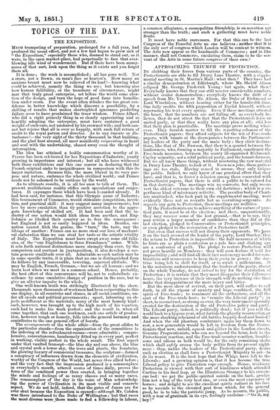APPROACHING TRIUMPH OF PROTECTION.
By clubbing their forces from various parts of the country, the Protectionists are able to fill Drury Lane Theatre, with a supple- mental meeting in St. Martin's Hall: what then ? They have had a similar demonstration at Edinburgh, where Mr. Sheriff Alison eclipsed Mr. George Frederick Young : but again, what then ? Everybody knows that they can still muster considerable numbers, without ocular demonstration ; everybody knows the drift of a speech from Mr. Young or Mr. Alison, the Duke of Richmond or Lord Winchilsea, without hearing either for the hundredth time. One fully credits the fifth proposition of Euclid himself, without reperusing his text every spring. Even if these meetings attested the boast, that the numbers are not falling off, as everybody be- lieves, they do not attest the fact that the Protectionists form an united party, or that they really have any plan at all ; still less that their plan is practicable. The meetings prove nothing what- ever. They furnish matter to fill the reporting columns of the Protectionist papers ; they afford subjects for the wit of Free-trade papers, with taunts at the discrepancies between the Parliament- ary leaders of the party and the main body ; they elicit'declara, tions, like that of Mr. Dawson, that there is a quarrel between the landowners, who, forming a majority in Parliament, sanctioned the Free-trade measures, between the scanty ill-organized Richmond- Cayley minority, not a solid political party, and the tenant-farmers. But we all knew these things, without mustering the raw material in Drury Lane Theatre, to look at it. Even as a joke, these gather- ings are too stale. Having ceased to amuse, they only fatigue the public. Indeed, we only know of one practical effect that they have, and that is, to foster a delusion among those connected with Protectionist papers, that there is still a public to be catered for in that doctrine. The meetings win no converts, but only recon- vert the oldest veterans to their own old doctrines ; which is a su- perfluous kind of missionary activity. The peculiar body of Chart- ists unattached, who took part in the supplemental meeting, were evidently there not as recruits but as recruiting-sergeants. As regards any gain to Protection, these meetings are nullities.
If the Protectionists are to achieve anything of the nature of prac- tical gain, it must be at the election; and there, unquestionably, they may recover some of the lost ground,—that is to say, they may return a larger number of candidates than they did at the last election, pledged to Conservative or Protectionist principles, or even pledged to the restoration of a Protective tariff.
But even that success will not disarm their opponents. Weave it on the tacit avowal of the leader of the party, Lord Stanley, that the return to Protection is impossible : the half measures at which he hints are as plain a confession as a pale face and slinking eye are a confession of guilt. The pledge to restore Protection will not press heavily on Members : they will soon declare it void for impossibility ; and will find all their tact and energy needed for com- binations and mane-m.11.es to keep their party in power ; the doc- trine being left to shift for itself, or to await a millennium. It is the notorious understanding that the leaders of the party, absent on the whole Tuesday, do not intend to try for the restoration of Protection ; it is certain that they must disappoint their followers: hence, the very increase of their strength will do nothing else than make that disappointment the more heavy and bitter. But the mere show of revival, on their part, will suffice to call forth, in all the vigour of anxiety and hope combined, the full spirit of Free-trade ; to reanimate all the enthusiasm, and all the Cant of the Free-trade host; to "reunite the Liberal party" ; in short, to reconstruct, as strong as ever, the very instrument specially created for the destruction of the old Protective policy and party. The Liberal party, indeed, is politically dead ; but if you roll the world back to a bygone year, what forbids the ghastly resurrection, or the more shocking rehearsal of old battles happily dead and buried ? And when the old phantom combatants again lay them down to rest, a new generation would be left in freedom from the Protec- tionists that now, unlaid, squeak and gibber in the London streets. Genuine Progressionists, who can see beyond the hour, look to the Protectionist reaction, and the Free-trade counter-reaction, trouble- some and odious as both would be, for the only remaining shake which shall safely arouse the body politic from its present night- mare : they, unlike the leaders of the Protectionist party, desire such an election as shall force a Protectionist Ministry to act—to do its worst. It is the best hope that the Whigs have left to the Liberals ; and a growing opinion is, that it has become the true Liberal policy to give Protection rope enough. Hence, residuary Protection is viewed with that sort of kindliness which attended Curtius to his final leap, or the Illustrious Stranger to his cavern- ous bed : we pat the public-spirited suicide on the back, grudge him not a bag of the very best rice, or even the most expensive of horses; and delight to see the excellent spirits radiant in his face as he ascends to the elevated post from which, for the general good, he is to take the patriotic jump. As he mounts, the public, with a tear of gratitude in its eye, feelingly exclaims—" Go it, my boy ! "


























 Previous page
Previous page